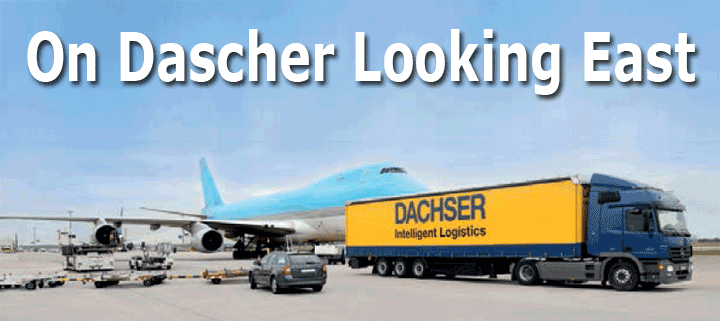On Dascher Looking East

German
logistics group Dachser is looking east in a bid to grow its air freight
business.
 The
drive to boost Dachser’s air freight business by expanding the network
has seen the company develop increased focus on Asia, with both organic
expansion and acquisitions on the agenda. But air has always been a core
part of the business, according to Edoardo Podestá, managing director,
Air & Sea Logistics Asia Pacific for Dachser Far East Ltd. The
drive to boost Dachser’s air freight business by expanding the network
has seen the company develop increased focus on Asia, with both organic
expansion and acquisitions on the agenda. But air has always been a core
part of the business, according to Edoardo Podestá, managing director,
Air & Sea Logistics Asia Pacific for Dachser Far East Ltd.
“Airfreight has always been one of our strengths
and as a company we have a long standing history in this exciting business,”
he told FlyingTypers.
“From the early days when Dachser was the first
forwarder to open an airfreight office at Munich Airport in 1951, until
today where we are amidst the TOP 20 ranking airfreight forwarders, according
to IATA.
“Our latest moves in Asia were comprised of the
opening of PT Dachser in Indonesia in November 2013 and taking 100 percent
ownership of our former joint venture in Korea, effective Jan 1st 2014.
“This has been the latest addition to an ever
growing list of established Dachser locations in the Asia Pacific region
that already includes China, Hong Kong, Taiwan, Vietnam, India, Thailand,
Bangladesh, Singapore, and Malaysia.
“We have now set our eyes on other markets in
Asia and we will continue our network expansion much like we did in the
previous years.”
Podestá admits, however, that Asian markets can
be quite daunting, with competition fierce across all sectors and markets,
and implications both for airlines and their forwarder customers.
“The struggle of all airlines for market share
is strong and it’s putting a strain on all airlines as far as the
level of freight rates is concerned,” he said.
“We are fighting the decline by offering better
and more intelligent solutions to our customers whenever we see the possibility
to do so.
“Plain airport-to-airport businesses have become
extremely competitive.
“We believe this will change, but as of now it
is a reality that we, and any other stakeholder in the airfreight industry,
has to deal with.
“Still, due to strategic alliances with our airline
partners, solid BSA programs, value added offerings, and the right strategies,
we are continuing sustainable growth in our airfreight business.”
Acccording to Podestá, Dachser managed to expand
its air freight business last year despite the strong competition and
weak rates.
“A highlight for us and ultimately our customers
was certainly that 2013 was the first full year for us as a global partner
of Lufthansa Cargo,” he explained.
“A market leader in its segment, Lufthansa limits
its global partnership program to a very small and exclusive group of
members. “This puts Dachser in the front row of globally leading
freight forwarders.
“Above all however it allows us to offer premium
airfreight forwarding services to our customers paired with attractive
conditions and solutions.”
Podestá is one of life’s optimists, and
he anticipates that air freight markets are due to see improvement in
the months ahead.
“We believe that the downward spiral of airfreight
rates, predominantly from Asia to Europe, has come to an end and there
are pointers that we can anticipate increasing prices in the foreseeable
future,” he said. “This will allow the entire industry to
breathe and go back to focusing on service quality and service advancements,
rather than the cut-throat competition that was dominating much of the
market in recent years.
“This mid-term will also translate into benefits
for shippers and consignees.
“Besides that, we also see continuous growth in
the Intra-Asia airfreight market and we are excited to be in the fortunate
position to participate in this trend through our network in Asia and
the solid customer base we have built over the years in the region.”
He said other markets including South America were harder
to predict and remained somewhat “volatile and prone to sudden changes,”
although he also expects an overall upward trend in the future. But he
expects the company’s investment in technology to offer a cutting
competitive edge on European outbound lanes.
“Especially on the Europe outbound side, we have
in the recent past invested heavily in screening and X-ray equipment in
various locations in Europe in order to respond to the EU regulations
EC300/EU185 stipulating more stringent security and screening measures
for the European airfreight industry,” he said.
“This was of course done to have a positive impact
on our customers’ businesses.
“The avoidance of screening bottle necks at major
gateways in Europe has just been one of the positive effects we aimed
for and eventually realized through these investments.”
SkyKing |






